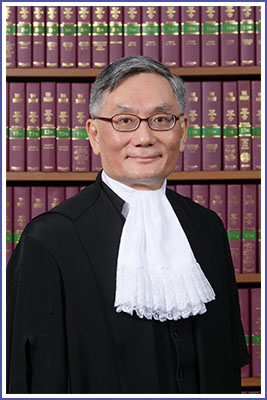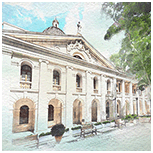Welcome Remarks

This Report provides an overview of significant developments of the Judiciary in 2023.
The year of 2023 marked Hong Kong’s return to normalcy as the COVID-19 pandemic alleviated and waned. The Judiciary was thus able to fully resume normal court business without the restrictions of previous years. The Judiciary, steadfastly committed to upholding the rule of law and judicial independence in Hong Kong under the “One Country, Two Systems” arrangement, continued to make concerted efforts towards enhancing the effective and efficient administration of justice despite the challenges the pandemic brought.
The effectiveness and efficiency of the administration of justice is dependent upon the number and the quality of judges and judicial officers. In response to the continued shortfall in judicial manpower, the Judiciary launched open recruitment exercises and has pro-actively promoted judicial careers to legal professionals in order to attract Hong Kong’s best and brightest to the Bench.
Counting the five judicial appointments made in 2023, there are now 160 substantive judges and judicial officers serving at all levels of court. Around 40 deputy judges and judicial officers appointed from the legal profession also sit at different levels of court at any one time. Notably, one new Non-Permanent Judge from another common law jurisdiction was appointed to the Court of Final Appeal in 2023.
The enhancement of the professional qualities of Hong Kong’s judges and judicial officers remains a priority for the Judiciary. With the abatement of pandemic-related restrictions, the Judiciary has been able to organise and participate in a rich and diverse array of judicial training and exchange programmes with the Mainland and overseas jurisdictions, on top of the regular and core training programmes arranged by the Hong Kong Judicial Institute.
Four judicial exchanges and court visit programmes to Beijing, the Greater Bay Area and Macao were held in 2023. These included the Seventh Seminar of Senior Judges of Cross Strait and Hong Kong and Macao in Macao in September 2023, as well as an exchange programme for 17 judges and judicial officers in collaboration with the National Judges College in October 2023. The Judiciary has also launched an attachment programme in collaboration with the Supreme People's Court (“the SPC”). Under this programme, Mainland judges will be attached to Hong Kong courts and vice versa in order to enhance understanding of each other’s judicial system and court operations, primarily in civil and commercial proceedings. In the inaugural exchange, three Mainland judges were attached to the High Court between mid-September and mid-December 2023.
In addition to the aforementioned exchanges with the Mainland and other parts of the country, representatives from the Hong Kong Judiciary also attended the Asia Pacific Judicial Colloquium in New Zealand in March 2023, where we engaged in professional exchanges on a broad range of subjects with our common law counterparts from Australia, Canada, New Zealand and Singapore. Hong Kong’s judges and judicial officers also participated in other judicial conferences, seminars and exchange activities held locally, in the Mainland and overseas. The Judiciary also received judges and visitors from the legal sector and senior government officials from the Mainland, Brunei, Azerbaijan, Indonesia, Papua New Guinea and Qatar in 2023.
The Judiciary’s series of seminars on Chinese law and the legal and judicial system in the Mainland continued with a seminar in March 2023 on “The Civil Code of the People's Republic of China”. In June 2023, the Judiciary was able to resume its talks by Non-Permanent Judges of the Court of Final Appeal with a talk entitled “Sir Edward Coke and the Common Law”, delivered by the Hon Mr Justice Patrick KEANE, Non-Permanent Judge of the Court of Final Appeal.
Turning to Judiciary operations, the Judiciary continued to cope with the challenges of a persistently heavy caseload. In 2023, this workload was compounded by a significant number of court proceedings which had been postponed from previous years due to the reduced capacity of the courts during the pandemic, as well as an increasing number of complex criminal cases that took longer to process. Despite these challenges, with the concerted efforts of all judges and judicial officers, and our dedicated support staff, optimum use was made of the limited available manpower and facilities, and the Judiciary was able to process an overall caseload comparable to that of 2019, before the outbreak of the pandemic.
The Judiciary continued to prioritise the processing of the about 2 500 cases related to the 2019 anti-extradition amendment bill incidents (“anti-EAB cases”) and national security (“NS cases”). While new cases continued to be brought to court in 2023, around 92% of these cases have now been concluded. At present, efforts are being dedicated to handling NS cases at the High Court and outstanding anti-EAB cases at the District Court, many of which are complex criminal cases involving long trials. At the same time, the Judiciary has been processing thousands of cases in relation to non-refoulement claims at the High Court expeditiously through multi-pronged measures.
To cater for the Judiciary’s short- and longer-term operational needs, we have been constructing new and additional courtrooms, as well as supporting facilities. Four new courtrooms were commissioned in the Wanchai Tower in 2023, with nine more expected to be commissioned in the High Court Building and the Revenue Tower in 2024. With the future needs of Hong Kong in mind, construction works on a new District Court Building at Caroline Hill Road for reprovisioning and co-locating the District Court, the Family Court and the Lands Tribunal are now underway. The new building is expected to be completed in 2026 for commissioning in 2027.
With the increased use of information and communication systems during the pandemic, the Judiciary has deepened its commitment to making greater and wider use of technology in enhancing the efficiency of court operations. We have been implementing the integrated Court Case Management System (“iCMS”) in phases to handle court-related documents and payments electronically, starting with the District Court and the Magistrates’ Courts in 2022. The Judiciary aims to roll out the iCMS incrementally in the Court of Final Appeal, the High Court, the non-summons cases of the Magistrates’ Courts and the Small Claims Tribunal starting in 2024. Ultimately, we intend to mandate the use of iCMS for all legally represented litigants within a target timeframe. The Judiciary will thus consult the legal profession and other stakeholders on the implementation of such mandatory arrangements.
The Judiciary is committed to continuing to make greater and better use of court-technology initiatives, including e-bundles for court hearings, remote hearings for appropriate cases, e-appointments for specific court services, and a digital evidence and exhibits handling system, as and when appropriate. The introduction of such initiatives must of course be carefully balanced against any potential security issues.
The Judiciary has also been testing voice recognition software, particularly in respect of the accuracy of voice recognition for court hearings in English and Cantonese. We have started to promulgate the use of this technology for judges and judicial officers for taking notes during court proceedings. The Judiciary will continue to monitor this technology and developments in its quality, with a view to optimising its use in preparing transcripts in future.
Separately, the Judiciary will launch a trial run of live broadcasting of two court proceedings from the Court of Final Appeal to the public in January 2024. Live broadcasting of court proceedings enhances the transparency of court procedures and public confidence in the judicial process. We understand that not all proceedings are inherently suitable for live broadcasting – hence the need to take account of the results of this trial run to draw up guiding principles and implementation practicalities for a longer-term pilot scheme some time in 2024.
A number of important legislative and procedural initiatives also emerged in 2023. First, and in connection with the deepening commitment to technological innovation, the Judiciary has been developing the draft Courts (Remote Hearing) Bill to enable both civil and criminal courts to conduct remote hearings when appropriate. In conducting remote hearings, the courts will consider all the relevant circumstances, as well as the dual requirements of open justice and fairness. Having undertaken a public consultation and sought views from the Panel on Administration of Justice and Legal Services of the Legislative Council, the Judiciary is pleased to report the Bill is being finalised, with a view to its introduction into the Legislative Council some time in 2024.
Second, the Family Procedure Ordinance, which provides the statutory basis for a consolidated set of procedural rules to enhance the efficiency and cost-effectiveness of the family justice system, was passed by the Legislative Council in June 2023. The Family Procedure Rules Committee established under the Ordinance is now preparing the draft procedural rules. A new Masters system was also established in the Family Court under the Ordinance in October 2023, with Family Masters empowered to handle certain procedural matters in family-related proceedings so as to alleviate the heavy workload of the Family Judges.
On mutual legal assistance between Mainland and Hong Kong courts, the Chief Judge of the High Court made rules in November 2023 to provide for the practices and procedures for reciprocal recognition and enforcement of judgments in civil and commercial matters by Hong Kong and Mainland courts. These rules will come into operation on 29 January 2024. At the same time, the Judiciary will continue to work closely with the Government and the SPC on improving the implementation of existing mutual legal assistance arrangements with the Mainland, in particular, the arrangements for the mutual service of judicial documents in civil and commercial proceedings between the two jurisdictions.
I would like to take this opportunity to thank members of the community, the Government and the Legislative Council for their invaluable support for the work of the Judiciary. I would also like to express my gratitude to my fellow judges and judicial officers, as well as the staff in the Judiciary for their dedication towards the administration of justice and professionalism in meeting the challenges this year, and the years ahead.
Andrew CHEUNG
Chief Justice


